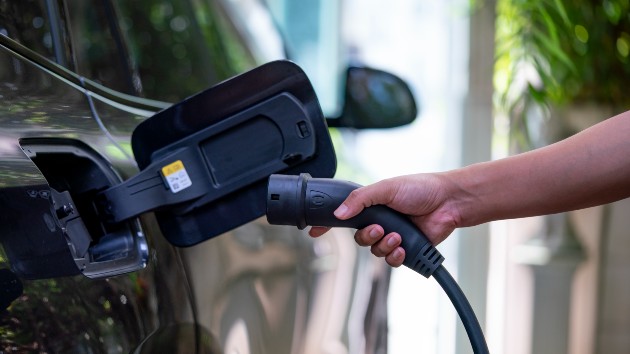(WASHINGTON) — Amid a contentious election year debate over the future of U.S. auto manufacturing, the Environmental Protection Agency on Wednesday announced new vehicle emissions standards that will pressure the industry to make more electric vehicles.
“With transportation as the largest source of U.S. climate emissions, these strongest-ever pollution standards for cars solidify America’s leadership in building a clean transportation future and creating good-paying American jobs, all while advancing President Biden’s historic climate agenda,” EPA Administrator Michael Regan said.
The standards impact newly manufactured cars and trucks from model years 2027 to 2032 and represent an average of allowed emissions across an auto manufacturer’s entire fleet of offered vehicles.
“Three years ago, I set an ambitious target: that half of all new cars and trucks sold in 2030 would be zero-emission,” President Joe Biden said in a statement.
“I brought together American automakers. I brought together American autoworkers. Together, we’ve made historic progress. Hundreds of new expanded factories across the country. Hundreds of billions in private investment and thousands of good-paying union jobs,” he said. “And we’ll meet my goal for 2030 and race forward in the years ahead.”
Senior administration officials emphasized that manufacturers will have multiple pathways to compliance using a combination of battery electric vehicles, plug-in hybrids, strong hybrids and improved internal combustion engines.
Officials explained that these new standards will reduce U.S. greenhouse gas emissions by 7.2 billion metric tons through 2055. That’s about four times the total emissions of the transportation sector as of 2021.
“This actually is a huge win for all Americans. The standards will help tackle one of the nation’s largest sources of climate pollution — our cars and our trucks,” Luke Tonachel, senior strategist for the transportation sector for the Natural Resources Defense Council, told ABC News. “There is a shift that the auto industry is undergoing towards cleaner vehicles, but these standards ensure that we get to the lower pollution levels that we absolutely need.”
The standards are also expected to have public health impacts, with officials saying they will prevent up to 2,500 premature deaths in 2055 and reduce health issues such as heart attack, aggravated asthma and decreased lung function.
Wednesday’s announcement is not the most ambitious version of these standards proposed by the EPA in April 2023, but allows for a slower ramp up to compliance for auto manufacturers.
Administration officials say they decided on a slower rollout of the standards to make them more durable and give the auto market more lead time to come into compliance.
In a press call on Tuesday, League of Conservation Voters vice president of federal policy Matthew Davis explained that the Biden administration is also mindful of releasing these standards during an election year and insulating them from possible rollbacks.
“We certainly have had conversations with the Biden administration and they are crystal clear about the importance of getting rules out to make sure that they withstand both legal challenges from the fossil fuel industry and any congressional attacks should Republicans take over the Senate and the White House,” Davis said.
The Trump administration previously rolled back Obama-era standards that were meant to affect vehicles manufactured through 2025.
The announcement of new standards also comes just days after former President Donald Trump criticized Biden’s handling of the transition to electric vehicles at a campaign event for Ohio Senate candidate Bernie Moreno.
“We’re gonna put a 100% tariff on every single car that comes across the line, and you’re not gonna be able to sell those guys, if I get elected,” Trump said.
Despite the contentious rhetoric around EVs and car manufacturing in the U.S., environmental groups say it’s important to characterize the rules correctly, noting that they don’t call for a ban on traditional gas-powered cars.
“It’s important to underscore that EPA standards — they’re performance based. They don’t require manufacturers to sell any particular type of vehicle,” Peter Zalzal, associate vice president of clean air strategies for the Environmental Defense Fund, told ABC News. “You can see the standards being met by improvements in internal combustion engine vehicles, hybrids, plug-in hybrids, and battery electric vehicles, so it’s really about more choice.”
Davis echoed that sentiment, saying, “There are a variety of pathways to meet the standards, and any messaging indicating that this is a fossil fuel car ban is just misinformation from the fossil fuel industry and should be treated as such.”
ABC News’ Lalee Ibssa and Soorin Kim contributed to this report.
Copyright © 2024, ABC Audio. All rights reserved.












